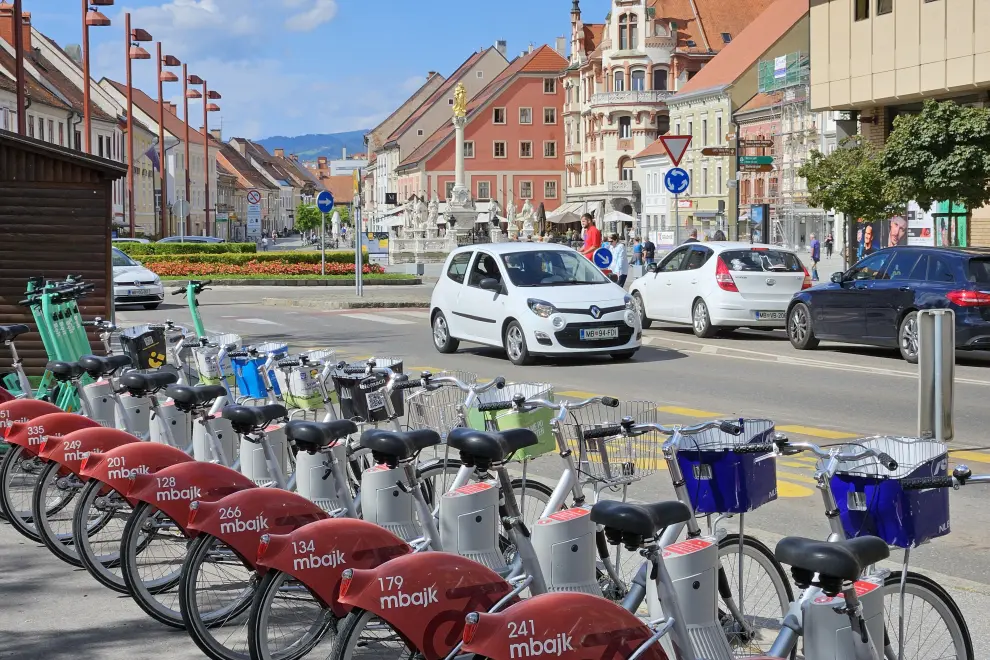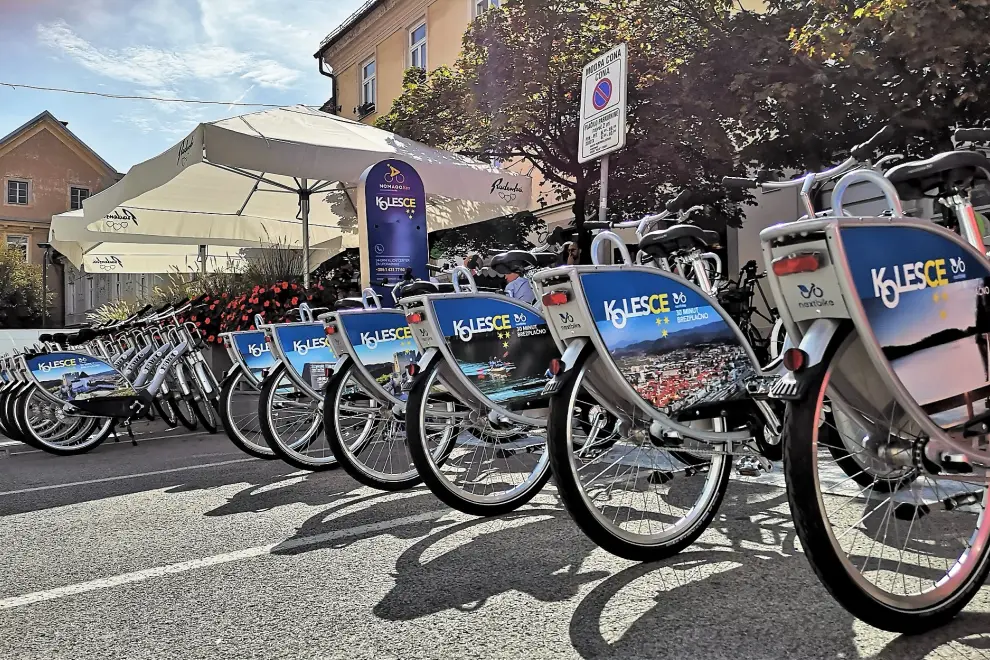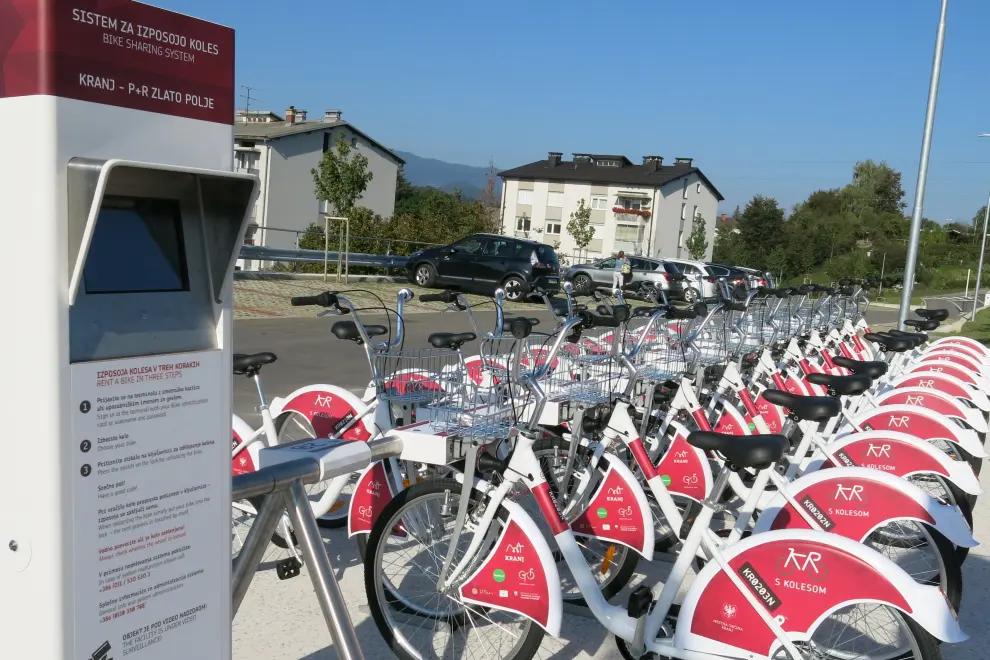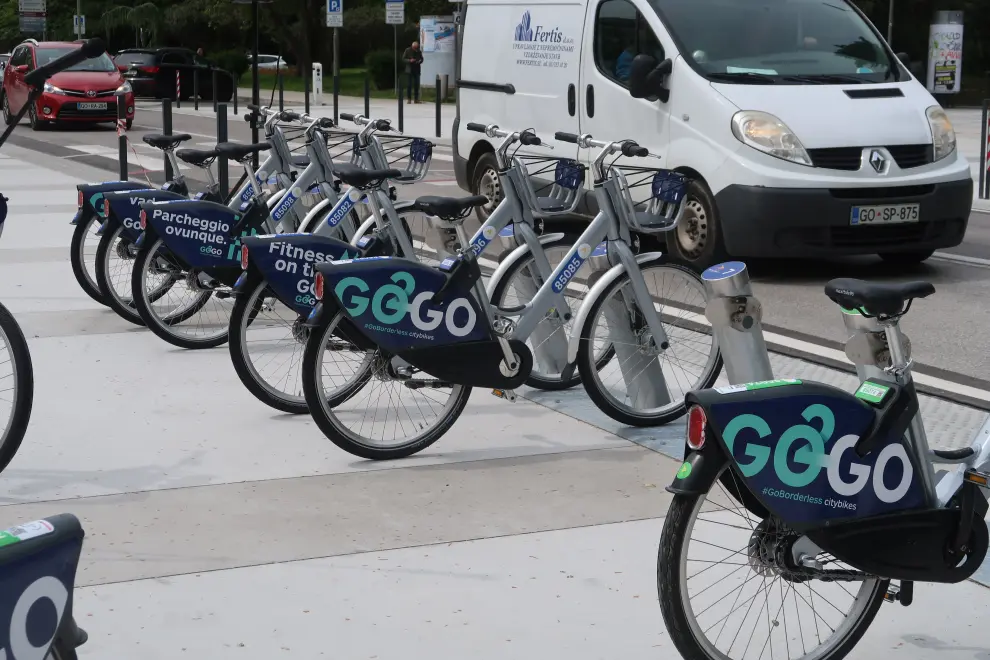Bicycle-sharing systems ever more popular
Public bike share schemes have been springing up across Slovenia in recent years with ever more towns also offering electric bikes. Bike sharing is increasingly popular too, one of the reasons being it is often the fastest way to go about, making it easy to navigate traffic jams.
The capital Ljubljana was the first to set up such a system in 2011, starting off with 300 bikes and 30 docking stations. BicikeLJ has since expanded to 840 bikes and 84 pick-up stations.
Set-up in a public-private partnership between the municipality and outdoor advertising provider Europlakat, the system is financed mainly from advertising revenue. It has been developed by France's JCDecaux.
Since 2011, the system has recorded almost 12 million rentals. As a rule users take bikes out for less than an hour, during which time the rental is free, the Ljubljana authorities say.

A bycicle dock in Maribor. Photo: Andreja Seršen Dobaj/STA
Slovenia's second largest city, Maribor uses the same system as Ljubljana, but it is called MBajk there. The city launched it in May 2022, exactly eleven years after Ljubljana.
In both cities users need to register into the system online and pay an annual fee of €3 from where they can ride for free for up to an hour at a time.
MBajk currently has 26 docking stations with an additional three to be added soon. So far users have made roughly 950,000 rides and the system has become part and parcel of the city's infrastructure, Maribor authorities say.
Both Ljubljana and Maribor only have normal bikes in their public systems, although Nomago, a travel and transportation company, has been operating its e-bike rental system in Ljubljana since 2022. Nomago's system is also present in several other parts of the country.
Demand for electric bikes has been increasing, says Mladen Bijeljac, technical and operations manager at MM IBIS, a company that has developed a bike rental app, Mobiln.si, which is used by almost 40 Slovenian municipalities.
E-bikes are a particularly good solution for places with rolling terrain, and come handy for older people and for long distances. "Generally speaking, everyone would have electric bikes today, but municipalities are limited because they are much more expensive than conventional bikes," he says.

A bicycle sharing dock in Celje. Photo: Lili Pušnik/STA
Celje, Slovenia's third largest city, set up its bike sharing system KolesCE in September 2018 to promote sustainable mobility among residents and offer them alternative forms of travel. They also want to improve the city's air quality, reduce the carbon footprint and contribute to healthier lifestyles, they say.
Their system currently has 39 docking stations with a total of 214 bikes, just over half of which are electric. By the end of January this year, KolesCE has recorded 290,000 rentals.
Bicycles in Celje can be rented via a special app on your phone or a card, for an annual subscription of €10 for normal bikes and €20 for electric ones. It is also possible to rent them without subscription in which case a fee of 50 cents per 30 minutes applies for a regular bike and a euro for an e-bike.
Kranj, the regional centre of northwestern Slovenia, set up its KRsKOLESOM rental system in 2017. It now features 30 pick-up stations with 144 normal and 75 electric bikes, plus two electric cargo tricycles for rides in the old town.
Save for the pandemic period, the use of the bicycles has been increasing year after year. Ever more people use them in winter as well, especially in the city centre. "So the decision to keep the system in use all year round was the right one," the Kranj authorities say.

A bycicle sharing dock in Kranj. Photo: Tinkara Zupan/STA
The KRsKOLESOM system is part of the wider regional Gorenjska Bike system, which provides a bicycle rental service in several municipalities, including in Cerklje na Gorenjskem, Jesenice, Naklo, Radovljica, Škofja Loka, Tržič and Bled.
Prices are the same in all municipalities. The annual package costs €25, the monthly €10 and a three-day package €3.
Nova Gorica in the west of the country launched its bike sharing system, Go2Go, in 2021 with the help of EU funds. About half of the 89 bikes at 20 stations are electric.
The system went transborder in 2023 when three Go2Go docking stations were set up in Gorizia across the border in Italy. The two border cities will host the European Capital of Culture in 2025.
Users can also rent tandem and cargo bicycles. The municipality says they want to encourage the use of bikes as a mode of transport for people and cargo at shorter distances, which is practical in particular in urban areas.

A bicycle sharing dock in Nova Gorica. Photo: Rosana Rijavec/STA
Novo Mesto in the southeast of the country set up its GoNM bike share scheme in 2017 and has since expanded it to the neighbouring municipalities of Straža, Mirna Peč and Trebnje. A hundred bikes are available at 24 docking stations, more than half of them electric.
"People have received the system well; given that Novo Mesto has a bit of rolling terrain, the selection of electric bikes has been particularly well received," the municipality says.
The bikes can be borrowed after registering and buying a card at vending points, or, alternatively, by using the app available in the Mobiln.si system.
Bijeljac says it is easier for municipalities to use their app, as they do not have to develop and maintain their own system, and MM IBIS takes care of the logistics, bike servicing, etc.
"The user downloads the app, registers into the system, checks which bike is available and rents it without having to contact the terminal at the docking station," he says. The user can lease 840 minutes per week and then schedule when to use them. Once the quota is used up, the bike cannot be rented again that week.
"In this way we want to ensure that all users have equal access to bikes, and achieve what these rentals aim to achieve, which is shorter, multiple rentals," he says.
The cost of a weekly package depends from one municipality to another, ranging from €15 to €25. It also depends on whether the package allows you to rent just normal bikes or electric bikes as well.
The experience so far is that 90-95% of the users stick by the rules, while there are also some who damage bicycles, fail to dock them and such. There are also cases of vandalism, which Bijeljac says they consider to be part of business in a way.


